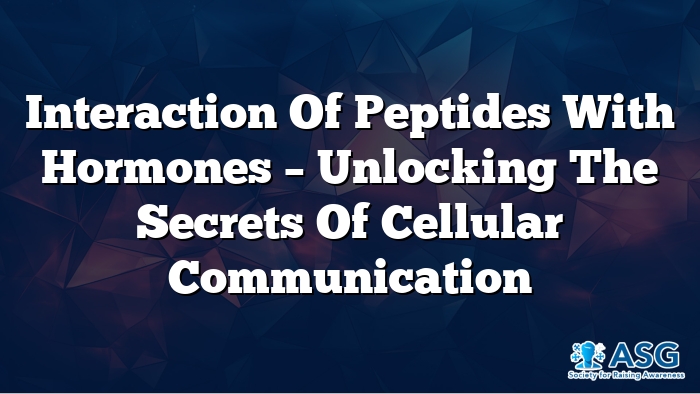Interaction of Peptides with Hormones – Unlocking the Secrets of Cellular Communication

Cellular communication is a complex and intricate process that relies heavily on the actions of peptides and hormones. These powerful molecules work in tandem to regulate various physiological processes, from growth and metabolism to immune responses. By delving deeper into the world of peptides and hormones, we can gain valuable insights into their therapeutic potential and role in disease mechanisms.
What are Peptides?
Peptides are short chains of amino acids linked by peptide bonds. These versatile molecules are smaller than proteins and can be either naturally occurring or synthetically produced. Peptides play crucial roles in numerous biological functions, acting as hormones, enzymes, and signaling molecules.
Classification of peptides can be based on their function, structure, or origin. Common types include:
• Signaling peptides
• Antimicrobial peptides
• Neuropeptides
The specificity and potency of peptides make them valuable tools in research and medicine. Peptide powders and peptide solutions are widely used in laboratories and peptide clinics for various applications.
How Do Hormones Influence Cellular Communication?
Hormones are chemical messengers produced by endocrine glands that travel through the bloodstream to target specific organs and tissues. They influence cellular communication by binding to receptors on target cells, triggering a cascade of biochemical reactions that regulate cellular functions.
Hormones can be categorized based on their chemical structure and function:
1. Peptide hormones
2. Steroid hormones
3. Amino acid-derived hormones
Each type of hormone has a unique mechanism of action and targets different cells and tissues. The intricate interplay of these hormones is crucial for maintaining homeostasis and regulating various physiological processes.
Mechanisms of Peptide-Hormone Interactions
Peptide-hormone interactions involve the binding of peptides to hormone receptors on target cells. This binding initiates a series of biochemical reactions that regulate cellular functions. The mechanisms of these interactions can vary depending on the specific peptide and hormone involved.
Some peptides act as agonists, binding to hormone receptors and activating them. Others function as antagonists, blocking hormone receptors and preventing their activation. Understanding these mechanisms is crucial for developing targeted therap

ies and unraveling the complexities of disease processes.
Role of Receptors in Peptide and Hormone Signaling
Receptors are specialized proteins located on the surface of target cells that bind to specific peptides and hormones. These receptors are highly specific and can distinguish between different signaling molecules. The binding of a peptide or hormone to its receptor triggers a series of biochemical reactions that regulate cellular functions.
Receptors can be classified into different types based on their structure and function:
• G protein-coupled receptors
• Receptor tyrosine kinases
• Nuclear receptors
Each type of receptor has a specific mechanism of action and targets different cells and tissues. The study of receptors is crucial for understanding peptide and hormone signaling and developing targeted therapies.
Types of Hormones Involved in Cellular Communication
Hormones involved in cellular communication can be classified into different types based on their chemical structure and function. Peptide hormones, such as insulin and glucagon, are composed of amino acids. Steroid hormones, including cortisol and estrogen, are derived from cholesterol. Amino acid-derived hormones, like thyroid hormones and catecholamines, are synthesized from amino acids.
Understanding the different types of hormones and their specific roles in cellular communication is essential for developing targeted therapies and unraveling the complexities of various physiological processes.
Peptide Synthesis and Function
Peptide synthesis involves the chemical or biological production of peptides. This process can be carried out in laboratories using techniques such as solid-phase peptide synthesis or recombinant DNA technology. Peptide manufacturers play a crucial role in producing high-quality peptides for research and therapeutic applications.
Peptides have diverse functions in the body, including:
• Acting as hormones
• Functioning as enzymes
• Serving as signaling molecules
The specificity and potency of peptides make them valuable tools in research and medicine. Peptide authentication and peptide purity tests are essential for ensuring the quality and reliability of peptides used in research and clinical applications.
Impact of Peptide-Hormone Interactions on Metabolism
Peptide-hormone interactions have a significant impact on metabolism. Hormones like insulin and glucagon regulate glucose metabolism by influencing the uptake and utilization of glucose by cells. Peptides such as ghrelin and leptin play crucial roles in regulating appetite and energy balance by influencing the release of hormones that control hunger and satiety.
These interactions also influence lipid metabolism by regulating the breakdown and storage of fats. Hormones such as cortisol and growth hormone affect lipid metabolism by controlling the release of fatty acids from adipose tissue. Understanding these complex interactions is crucial for developing therapies for metabolic disorders and obesity.
Therapeutic Applications of Peptides
The specificity and potency of peptides make them valuable tools in therapeutic applications. They can be used to treat a wide range of conditions, including metabolic disorders, cardiovascular diseases, and autoimmune diseases. Peptide vials and peptide injections are common forms of administration in clinical settings.
Peptide clinics often utilize peptides to:
• Deliver drugs to specific targets
• Modulate immune responses
• Regulate cellular functions
The development of new peptide-based therapies is an active area of research, with peptide sciences constantly pushing the boundaries of what's possible in medicine.
How Do Peptides Affect Hormonal Balance?
Peptides can significantly influence hormonal balance by regulating the release and activity of hormones. For example, peptides like ghrelin and leptin play crucial roles in regulating appetite and energy balance by influencing the release of hormones that control hunger and satiety.
Some peptides, such as growth hormone-releasing hormone (GHRH), directly stimulate the release of hormones from endocrine glands. Understanding how peptides affect hormonal balance is crucial for developing therapies for endocrine disorders and optimizing overall health.
Advancements in Peptide Research
Recent advancements in peptide research have led to the development of new peptide-based therapeutics and research chemicals. Techniques such as solid-phase peptide synthesis and recombinant DNA technology have made it possible to produce peptides with high specificity and potency.
These advancements have also led to the discovery of new peptides with unique biological functions. Peptide quality control and peptide batch testing have become increasingly important as the field of peptide research continues to grow and evolve.
Challenges in Studying Peptide-Hormone Interactions
Studying peptide-hormone interactions presents several challenges due to the complexity of these interactions. Peptides and hormones can interact with multiple receptors and signaling pathways, making it difficult to determine their specific effects. The dynamic nature of these interactions adds another layer of complexity to research efforts.
Measuring the levels of peptides and hormones in the body can also be challenging. Techniques such as mass spectrometry and immunoassays are often used, but these methods can be time-consuming and require specialized equipment. Overcoming these challenges is crucial for advancing our understanding of peptide-hormone interactions and their role in health and disease.
Peptides in Endocrine System Regulation
Peptides play a vital role in regulating the endocrine system. They act as signaling molecules that control the release and activity of hormones. For instance, insulin and glucagon regulate glucose metabolism by influencing how cells uptake and utilize glucose.
Other peptides, such as growth hormone-releasing hormone (GHRH), directly stimulate the release of hormones from endocrine glands. Understanding the role of peptides in endocrine system regulation is crucial for developing therapies for endocrine disorders and optimizing overall health.
What Are the Benefits of Peptide Therapy?
Peptide therapy offers numerous benefits due to the specificity and potency of peptides. It can be used to treat a wide range of conditions, including metabolic disorders, cardiovascular diseases, and autoimmune diseases. Peptide clinics often administer peptides in various forms, including injections, vials, and solutions.
Some key benefits of peptide therapy include:
• Enhanced athletic performance
• Improved muscle growth and recovery
• Potential anti-aging effects
• Targeted treatment of specific conditions
As research in this field continues to advance, the potential benefits of peptide therapy are likely to expand, offering new hope for patients with various health conditions.
Peptide-Hormone Interaction in Disease Mechanisms
Peptide-hormone interactions play a crucial role in the mechanisms of various diseases. For example, insulin resistance, a key feature of type 2 diabetes, involves impaired peptide-hormone interactions that regulate glucose metabolism. These interactions can also influence the development and progression of cardiovascular diseases, autoimmune conditions, and certain types of cancer.
Understanding the role of peptide-hormone interactions in disease mechanisms is crucial for developing targeted therapies. By modulating these interactions, researchers hope to develop more effective treatments for a wide range of diseases.
Future Directions in Peptide and Hormone Research
The future of peptide and hormone research is promising, with several exciting directions on the horizon. Advances in peptide synthesis and recombinant DNA technology will likely lead to the development of new peptide-based therapeutics with even greater specificity and potency.
Research will continue to explore the mechanisms of peptide-hormone interactions and their role in disease processes. This knowledge will be crucial for developing new diagnostic tools and targeted therapies for various conditions.
Peptide marketplaces and online peptide stores are likely to play an increasingly important role in facilitating research and clinical applications. As the field grows, issues such as peptide legality, peptide safety, and peptide storage will become increasingly important considerations.
Conclusion
Peptides and hormones are crucial players in cellular communication, regulating a wide array of physiological processes. As our understanding of peptide-hormone interactions deepens, so does our ability to harness their potential for therapeutic applications. From metabolic disorders to autoimmune diseases, peptide-based therapies offer promising avenues for treatment.
However, the complexity of these interactions presents ongoing challenges for researchers. Overcoming these hurdles will be crucial for unlocking the full potential of peptides and hormones in medicine. As research continues to advance, we can expect to see new and innovative applications of peptides and hormones in both research and clinical settings.
Frequently Asked Questions
What are bioactive peptides?
Bioactive peptides are specific protein fragments that have a positive impact on body functions or conditions and may ultimately influence health.
How long is the shelf life of peptides?
Peptide shelf life varies depending on storage conditions but typically ranges from 6 months to 2 years when stored properly.
Are peptides legal for research purposes?
In many countries, peptides are legal for research purposes, but regulations vary. Always check local laws and obtain necessary peptide certificates before purchasing or using peptides.
| Feature | Description |
|---|---|
| Peptide Synthesis | Chemical or biological production of peptides |
| Hormone Types | Peptide, steroid, and amino acid-derived hormones |
| Receptor Types | G protein-coupled, receptor tyrosine kinases, nuclear receptors |
| Therapeutic Applications | Treatment of metabolic, cardiovascular, and autoimmune diseases |
| Research Challenges | Complexity of interactions, measurement difficulties |
